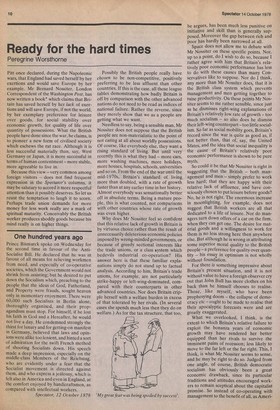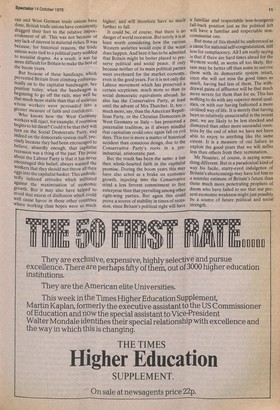Ready for the hard times
Peregrine Worsthorne
Pitt once declared, during the Napoleonic wars, that England had saved herself by her exertions and would save Europe by her example. Mr Bernard Nossiter, London Correspondent of the Washington Post, has now written a book* which claims that Britain has saved herself by her lack of exertions and will save Europe, if not the world, by her exemplary preference for leisure over goods, for social stability over economic growth, for quality of life over quantity of possessions. What the British people have done since the war, he claims, is to pioneer a new form of civilised society which eschews the rat race. Although it is less successful materially than, say, West Germany or Japan, it is more successful in terms of human contentment—more stable, more agreeable to live in.
Because this view — very common among foreign visitors — does not find frequent expression in the Spectator's columns, it may be salutary to accord it more respectful attention than it possibly deserves. So let us resist the temptation to laugh it to scorn. Perhaps trade union demands for more money for less work really are a mark of spiritual maturity. Conceivably the British worker produces shoddy goods because his mind really is on higher things. Possibly the British people really have chosen to be non-competitive, positively preferring to be less affluent than other countries. If this is the case, all those league tables demonstrating how badly Britain is off by comparison with the other advanced nations do not need to be read as indices of national failure. Rather the reverse, since they merely show that we as a people are getting what we want.
Needless to say, being a sensible man, Mr Nossiter does not suppose that the British people are non-materialistic to the point of not caring at all about worldly possessions. Of course, like everybody else, they want a rising standard of living. But until very recently this is what they had — more cars, more washing machines, more holidays, more houses, hospitals, schools, universities and so on. From the end of the war until the mid-1970s, Britain's standard of living more than doubled, with a rate of growth faster than at any earlier time in her history. Almost everybody was sensationally better off in absolute terms. Being a mature people, this is what counted, not comparisons with other countries whose rate of growth was even higher.
Why does Mr Nossiter feel so confident that this relative lack of growth in Britain is by virtuous choice rather than the result of unnecessarily deleterious economic policies imposed by wrong-minded governments, or because of greedy sectional interests like the trade unions, or a class system which bedevils industrial co-operation? His answer here is that these familiar explanations simply do not stand up to factual analysis. According to him, Britain's trade unions, for example, are not particularly strike-happy or left-wing-dominated, compared with their counterparts in other advanced countries. Nor does Britain cripple herself with a welfare burden in excess of that tolerated by her rivals. (In several cases she spends much less then they do on welfare.) As for the tax structure, that too, he argues, has been much less punitive on initiative and skill than is generally supposed. Moreover the gap between rich and poor has hardly been narrowed at all. Space does not allow me to debate with Mr Nossiter on these specific points. Nor, up to a point, do I wish to do so, because I rather agree with him that Britain's relatively poor economic performance has less to do with these causes than many Conservatives like to suppose. Nor do I think, any more than Mr Nossiter does, that it is the British class system which prevents management and men getting together to raise productivity. On these points Mr Nos siter seems to me rather sensible, since just as he dismisses right-wing explanations of Britain's relatively low rate of growth — too much socialism — so also does he dismiss their left-wing counterpart — too little social ism. So far as social mobility goes, Britain's record since the war is quite as good as, if not better than, that of, say, the United Sfates, and the idea that social inequality is the cause of Britain's relatively poor economic performance is shown to be pure myth. So could it be that Mr Nossiter is right in suggesting that the British — both man agement and men — simply prefer to work less hard; that they are happy with their relative lack of affluence, and have con sciously chosen to put leisure before goods?
No, he is not right. The enormous increase in moonlighting, for example, does not suggest that British workers arc all that dedicated to a life of leisure. Nor. do managers turn down offers of a car on the firm, when they can get one. The desire for mat erial goods and a willingness to work for them is no less strong here then anywhere else. But although he is wrong in attributing some superior moral quality to the British people — a preference for quality over quantity — his essay in optimism is not wholly without foundation.
For there is something impressive about Britain's present situation, and it is not without value to have a foreign observer cry out that John Bull has more clothes on his back than he himself chooses to realise.
Those, like myself, who have been prophesying doom — the collapse of democracy etc — ought to be made to realise that their apocalyptic forecasts were and are greatly exaggerated.
What we overlooked, I think, is the extent to which Britain's relative failure to exploit the bonanza years of economic growth may have rendered her better equipped than her rivals to survive the imminent pains of recession; less likely to move to the far left or the far right. This, I think, is what Mr Nossiter seems to sense, and he may be right to do so. Judged from one angle, of course, British democratic socialism has obviously been a great economic drawback, since its particular traditions and attitudes encouraged workers to remain sceptical about the capitalist promise. So instead of co-operating with management to the benefit of all, as Amen can and West German trade unions have done, British trade unions have consistently dragged their feet to the relative impoverishment of all. This was not because of any lack of interest in material riches. It was because, for historical reasons, the trade unions were tied to a political party wedded to socialist dogma. As a result, it was far more difficult for Britain to make the best of the boom years. But because of these handicaps, which prevented Britain from climbing enthusiastically on to the capitalist bandwagon, her position today, when the bandwagon is beginning to go off the rails, may well be that much more stable than that of societies Whose workers were persuaded into a greater measure of faith and confidence. Who knows how the West Germany workers will react, for example, if recession begins to hit them? Could it be that they will turn on the Social Democratic Party, and indeed on the democratic system itself, precisely because they had been encouraged to believe, absurdly enough, that capitalist recession was a thing of the past. The point about the Labour Party is that it has never encouraged this belief; always warned the workers that they should not throw all their eggs into the capitalist basket. This undoubtedly induced attitudes which militated against the maximisation of economic growth. But it may also have helped to avoid that excess of disillusion which could well cause havoc in those other countries Where working class hopes were so much higher, and will therefore have so much further to fall.
It could be, of course, that there is no danger of world recession. But surely it is at least worth considering how the various Western societies would cope if the worst does happen. And here it has to be admitted that Britain might be better placed to preserve political and social peace, if only because neither of its main political parties went overboard for the market economy, even in the good years. For it is not only the Labour movement which has preserved a certain scepticism, much more so than its social democratic equivalents abroad. So also has the Conservative Party, at least until the advent of Mrs Thatcher. It, too — much more, say, than the American Republican Party, or the Christian Democrats in West Germany or Italy — has preserved a paternalist tradition, as if always mindful that capitalism could once again fall on evil days. This too is more a matter of historical accident than conscious design, due to the Conservative Party's roots in a preindustrial, aristocratic past. But the result has been the same: a less then whole-hearted faith in the capitalist promise. During the boom years this may have also acted as a brake on economic growth, injecting into the Conservative mind a less fervent commitment to free enterprise than that prevailing among other right-wing parties. But again this could prove a source of stability in times of recession, since Britain's political right will have a familiar and respectable non-bourgeois fall-back position just as the political left will have a familiar and respectable noncommunist one.
But none of this should be understood as a cause for national self-congratulation, still less for complacency. All I am really saying is that if there are hard times ahead for the Western world, as seems all too likely, Brithin may be better off than some to survive them with its democratic system intact, since she will not miss the good times so much, having had less of them. The withdrawal pains of affluence will be that much more severe for them than for us. This has nothing to do with any superior moral qualities, or with our having fashioned a more civilised way of life. It is merely that having been so relatively unsuccessful in the recent past, we are likely to be less shocked and dismayed than other more successful countries by the end of what we have not been able to enjoy to anything like the same extent. It is a measure of our failure to exploit the goodyears that we will suffer less than others from their termination.
Mr Nossiter, of course, is saying something different. But in a paradoxical kind of way his facile, starry-eyed indulgence of Britain's shortcomings may have led him to a sounder estimate of Britain's future than those much more penetrating prophets of doom who have failed to see that our present economic weakness might just possibly be a source of future political and social strength.



































 Previous page
Previous page